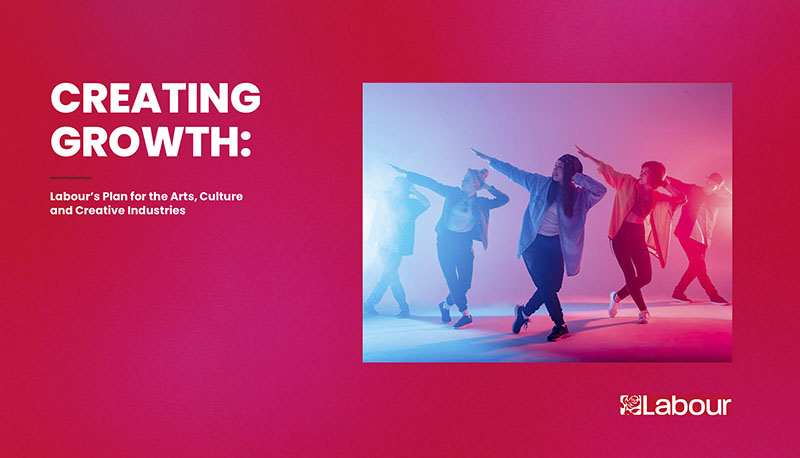Worth £125bn to the UK economy and still we are overlooked!
15th November 2024If we take you back to March of this year, you may remember Labour’s Plan for the Arts, Culture and Creative Industries entitled ‘Creating Growth’.
The plan was devised following the Labour’s Creative Conference, which involved 250 leaders across the creative industries discussing how the arts and a Labour government can work together on strengthening and developing our creative sectors ‘as a lynchpin for future growth’.
In the plan, the then Labour’s Shadow Secretary of State for Culture, Media and Sport, Thangam Debbonaire, said “we know that arts and culture are central to our national story – that our cultural lives are part of our sense of national pride.” “Labour in government will build on that success, and fire up the engines of our creative economy. It’s what we have always done.”

Thangam again spoke eloquently and with great pride and passion for the arts industry in April at The Stage’s ‘Future of Theatre Conference’. She told us that Labour was committed to keeping arts at the top of the agenda, prepared to rebuild the damage caused to the industry over the last two terms, prioritise creative support and funding, ensure access to the arts for all and committed to giving young people exposure to the arts.
All the things we wanted and needed to hear.
Labour won the election, and our industry was ready to be heard, supported and taken seriously. Sadly, we are still waiting.
The result of the recent Autumn budget announced by Rachel Reeves, was a telling sign that our industry wasn’t a priority.

Even though the arts are worth £125bn to the UK economy and is seen ‘as one of the government’s eight growth-driving sectors in its Industrial Strategy,’
we were overlooked on some vital elements. Why are we not getting the recognition we deserve?

Prior to the budget, industry leaders from SOLT and UK Theatres were campaigning for long term support of £300m over the next 10 years – around £30m per year to support around 20-30 projects for crucial repairs and for the industry to survive.
Yes, areas of our industry are being recognised and receiving additional funding, including the government’s ‘Creative Careers Programme’, which improve access to creative careers for young people aged 11-18 year old, the ‘Create Growth Programme’, which supports thousands of businesses and the ‘Supporting Grassroots Music Fund’, which Culture Secretary Lisa Nandy has welcomed along with other projects.
But is this enough to keep our industry afloat?
It’s very sad to see the lack of investment in our theatres, buildings and productions. SOLT and UK Theatres have said that without the funding, it’s likely that over the next five years, around 40% of venues are in danger of closing with another 40% may be unsafe to use.

Production costs and venue budgets will rise, and many will have to apply for more funding to produce any form of theatre.
Do these increases mean that ticket prices will need to go up? Are audiences also going to be hugely affected? Many theatre goers are already being priced out with no other access to live theatre and entertainment. We must be incredibly careful about not out-pricing loyal theatregoers and continue encouraging diverse audiences. Theatre after all is for everyone.

With the specialist performing arts schools challenged with the 20% tax charge from January, some students will be forced out and will put a stop to talent entering the performances arts industry. So much talent has haemorrhaged over the last few years, we can’t let this continue.
Young children who have no access to the arts and theatre will find it harder without the governments support of the SOLT and UK Theatre ‘Theatre for Every Child’ campaign. This vital campaign ensures theatre in the UK is accessible to all children. This would cost the government around £34m each year.

As costs rise, we have less funding and investment and it’s likely we will have fewer people entering the industry, what can we do to help our future?
We need to make our productions accessible to all. Whether that is keeping our tickets prices down or offering great theatre for free – we need to start doing something to get more people invested and interested in theatre.

Many companies take their work to schools, colleges, universities, places of work and other communities to open their eyes to the creative industries and show what we do can transform lives, tell stories that resonate and have a huge impact and influence on people.
But we can’t do this alone. We need the support from venues, professionals and creatives who understand the importance of theatre and can give time for very little pay or volunteer to help rebuild our industry for the next generation.
We are so undervalued as an industry when we have so much to give to so many people. We need to continue our fight for a better future.
Maybe one day we will be heard and get the support we need. We will not be seen as a luxury, but a vital part of a thriving economy.
Let’s hope it won’t be too late...
